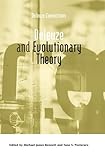Deleuze and Evolutionary Theory / Michael James Bennett, Tano S. Posteraro.
Material type: TextSeries: Deleuze Connections : DECOPublisher: Edinburgh : Edinburgh University Press, [2022]Copyright date: ©2019Description: 1 online resource (200 p.) : 5 B/W illustrationsContent type:
TextSeries: Deleuze Connections : DECOPublisher: Edinburgh : Edinburgh University Press, [2022]Copyright date: ©2019Description: 1 online resource (200 p.) : 5 B/W illustrationsContent type: - 9781474430494
- 9781474430517
- 576.801 23
- QH360.5 .D45 2019eb
- online - DeGruyter
| Item type | Current library | Call number | URL | Status | Notes | Barcode | |
|---|---|---|---|---|---|---|---|
 eBook
eBook
|
Biblioteca "Angelicum" Pont. Univ. S.Tommaso d'Aquino Nuvola online | online - DeGruyter (Browse shelf(Opens below)) | Online access | Not for loan (Accesso limitato) | Accesso per gli utenti autorizzati / Access for authorized users | (dgr)9781474430517 |
Frontmatter -- Contents -- Acknowledgements -- Introduction: Historical Formations and Organic Forms -- 1 Unnatural Nuptials -- 2 The Egg: Deleuze Between Darwin and Ruyer -- 3 Framing Sexual Selection: Elizabeth Grosz’s Work on Deleuze, Darwin and Feminism -- 4 Deleuze, Developmental Systems Theory and the Philosophy of Nature -- 5 Deterritorialisation and Creative Involution: A Note on Guattari and Deleuze -- 6 Hydrosocial Becomings: Evolutionary Perspectives on Water Assemblages and Maya Kingship -- 7 Against Social Evolution: Deleuze and Guattari’s Social Topology -- 8 Epigenesis and the Outside -- Notes on Contributors -- Index
restricted access online access with authorization star
http://purl.org/coar/access_right/c_16ec
Engages with the post-Darwinian biology central to Deleuze and Guattari’s ecological thoughtFinds a strong convergence in Deleuze and Guattari’s work with new directions in evolutionary theoryThinking about the symbiosis between philosophy and science in new waysSummarises, interprets and evaluates of Deleuze’s relationship to evolutionary theory, from Darwin through RuyerResists a straightforward characterisation of Deleuze as a critic of evolution, instead looking at his debt to – and his inheritance, reconfiguration and anticipation of – a number of tendencies integral to evolutionary thought, both in its historical and emerging dimensionsDeleuze and Evolutionary Theory gathers together contributions by many of the central theorists in Deleuze studies who have led the way in breaking down the boundaries between philosophical and biological research. They focus on the significance of Deleuze and Guattari’s engagements with evolutionary theory across the full range of their work, from the interpretation of Darwin in Difference and Repetition to the symbiotic alliances of wasp and orchid in A Thousand Plateaus. In this way, they explore the anthropological, social and biopolitical significance of the convergences and divergences between philosophy and evolutionary science.ContributorsBarry Allen, McMaster University, Canada. Michael James Bennett, University of King’s College in Halifax, Canada. Claire Colebrook, Penn State University, USAErin Hortle, University of Tasmania, USA. Paul-Antoine Miquel, University of Toulouse II – Jean Jaurès, France. Johan Normark, University of Gothenburg, Sweden. Tano S. Posteraro, Penn State University, USA. Jon Roffe, Deakin University and Melbourne School of Continental Philosophy, Australia.Daniel W. Smith, Purdue University, USA. Hannah Stark, University of Tasmania, Australia. "
Mode of access: Internet via World Wide Web.
In English.
Description based on online resource; title from PDF title page (publisher's Web site, viewed 29. Jun 2022)


